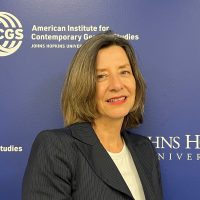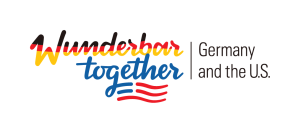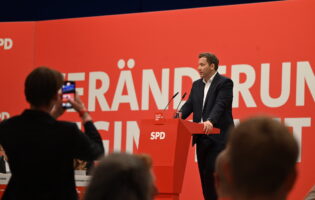
Welcoming Communities, Embracing Diversity – A Transatlantic Motto

Susanne Dieper
Director of Programs and Grants
Susanne Dieper is the Director of Programs and Grants at AICGS. She oversees the Institute’s programs and projects within the three AICGS program areas, manages all AICGS fellowships, and is in charge of grant writing. Her current focus is on issues related to transatlantic relations, immigration and integration, diversity, the next generation of leaders, workforce education, and reconciliation. She develops programs that align with the mission of AICGS to better understand the challenges and choices facing Germany and the United States in a broader global arena.
Previously, Ms. Dieper was in charge of organizational and project management at AICGS as well as human resource development and board of trustees relations. Prior to joining AICGS, she worked in transatlantic exchange programs, language acquisition, as well as the insurance industry in Germany.
Ms. Dieper holds an MBA from Johns Hopkins University with a concentration in International Business and an MA in English Linguistics and Literature, History, and Spanish from the University of Cologne. She has completed course work in nonprofit management at Johns Hopkins University.
__
Dallas, TX, Fayetteville, AR, and Nuremberg, Germany all have something in common: They have been developing a plan to welcome newcomers in their midst. What drives these initiatives? Economic growth and expansion, overall high rates of poverty, an increasingly diverse population, as well as the need for qualified workers all play an important role. All three cities are dynamic areas with a range of businesses looking to hire workers. The relatively low cost of living, particularly in Northwest Arkansas, but also in and around Dallas and Nuremberg, also make the areas attractive for newcomers.
All three cities are dynamic areas with a range of businesses looking to hire workers.
Immigration to Dallas has increased significantly in the last 10 to 15 years to the extent that over 40 percent of households speak a language other than English and immigrants comprise about 32 percent of the labor force. Across the state line, Fayetteville is home to a rising foreign-born population and its poverty rate (for the general population) stands at 24 percent. Other districts in Northwest Arkansas (NWA) have an immigrant population of up to 20 percent. In Germany, Nuremberg has one of the highest percentage rates of people with an immigration background (in 2017 it was 45.1 percent). Demographic diversity is commonplace in all three areas.
Initiatives in Dallas and Fayetteville started with the need to fight poverty, and both developed a task force approach focused on tackling poverty in Dallas and encouraging workforce development in Fayetteville. Those involved in the task force realized that more was needed: to be more welcoming to their city’s population. Dallas is committed to its core values: Empathy, Ethics, Excellence, and Equity. Fayetteville operates under the motto “Open Heart-Open Mind.” Nuremberg’s Welcoming Guide is geared toward skilled foreign workers and includes comprehensive details about all aspects of life in the city, from registering for residency and getting a driver’s license, to finding the right school for children, obtaining insurance, and finding an integration class. The guide is available in several languages, including Arabic, French, and Spanish.
Fayetteville’s Welcoming Hub has been rolled out online, with plans to build a physical Hub as a next step. Its goals include increasing its foreign-born population, offering information about city services in multiple languages, and increasing participation of its diverse population in local government. Engaging with the local community and neighbors in an effort to ensure that the native and long-time residents are part of the welcoming initiatives and supportive of the increasing diversity in their city is considered critical in Dallas and Fayetteville. Nuremberg’s guide includes information about what makes the city so desirable and livable; aside from finding work it also offers an array of cultural and leisure activities for its citizens.
Welcoming Cities like Dallas, Fayetteville, and Nuremberg recognize that their communities are increasingly diverse and they embrace it.
While the opportunity for economic growth, the ability to attract and retain successful enterprises, and the ability to offer quality jobs and careers to its citizens are the goals of many localities, some places offer a more nuanced and holistic view of living and working in their communities. Welcoming Cities like Dallas, Fayetteville, and Nuremberg recognize that their communities are increasingly diverse and they embrace it. All three cities view their diversity as positive and enriching and they are open to learning and improving the way they operate and function as a Welcoming City. Fayetteville may yet incorporate some of Germany’s integration initiatives, like the “Integration Pilots” (Integrationslotsen), an initiative that provides assistance to migrants, often by people with a migrant background, and exists in various forms throughout Germany. Dallas and Nuremberg’s shared goal of being a welcoming community for newcomers and educating and training their immigrant workforce make them natural allies. These commonalities offer opportunities to exchange ideas and practices at the city as well as community college and industry levels.
All three areas have welcomed their share of refugees and efforts to be a welcoming community naturally extend to those fleeing violence and oppression in their home countries. Non-governmental organizations on both sides of the Atlantic play an important part in helping those newcomers get settled in their new home countries. City governments, industries, religious charities, NGOs, schools and ordinary citizens (immigrant or non-immigrant) all do their part in the welcoming efforts. Be welcoming, embrace diversity, and apply the “golden rule” (as promoted by the Catholic Diocese in Dallas) are good standards to aspire to and abide by. These standards seem to bear fruit in places like Dallas, Fayetteville, and Nuremberg and benefit the entire community. In the process, they open up new avenues to strengthen the transatlantic bond and promote exchange.










